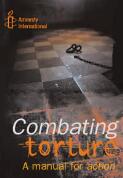26th June 2004: International Day in Support of Victims of Torture
by anna battista
 We've heard them all, we've seen them all. We've seen pictures of the tortures in Abu Ghraib prison, we've seen documentaries revealing the stories of the desaparecidos, we read books on concentration camps. We always seem to know terrible things such as torture too well, but we often do not realise that those forms of torture behind the camera lenses, behind those pages and the TV screens are real and are still practised all over the world, exactly in 132 countries.
We've heard them all, we've seen them all. We've seen pictures of the tortures in Abu Ghraib prison, we've seen documentaries revealing the stories of the desaparecidos, we read books on concentration camps. We always seem to know terrible things such as torture too well, but we often do not realise that those forms of torture behind the camera lenses, behind those pages and the TV screens are real and are still practised all over the world, exactly in 132 countries.
Torture is prohibited under international law. A number of international conventions and treaties condemn it, the most important of these is the UN Convention against Torture and Other Cruel, Inhuman or Degrading Treatment or Punishment which, in its Art.1, defines the term "torture" as meaning "any act by which severe pain or suffering, whether physical or mental, is intentionally inflicted on a person for such purposes as obtaining from him or a third person information or a confession, punishing him for an act he or a third person has committed or is suspected of having committed, or intimidating or coercing him or a third person, or for any reason based on discrimination of any kind, when such pain or suffering is inflicted by or at the instigation of or with the consent or acquiescence of a public official or other person acting in an official capacity. It does not include pain or suffering arising only from, inherent in or incidental to lawful sanctions."
Torture manifests itself in different forms: threats, beatings and sexual attacks are the most common, but to analyse the issue in depth and to understand what it really is, Amnesty International organised different events in different countries on 26th June, the International Day in Support of Victims of Torture. In Italy, Amnesty International organised a demo in Piazza Campo de' Fiori, Rome, to ask the Italian Parliament to pass a law that states torture is a crime and must be punished. Such a law is indeed still missing in the Italian legal system.
The organisation recently urged people to write to their own governments asking to sign and ratify the Optional Protocol to the UN Convention which aims to prevent torture in police stations and prisons and also made available to download on its site a manual entitled Combating Torture, which in its eight chapters helps understanding and fighting torture. Indeed, torture is not only the pain inflicted on prisoners, but it's also the psychological and mental torture inflicted on immigrants and asylum seekers living in temporary detention centres scattered a bit everywhere in Europe. It is and it means physical and psychological violation of a human being.
In Mahmoud Saeed's novel Saddam City, the main character, Mustafa Ali Noman, a teacher working in a school in Baghdad, is arrested by Saddam's security and, while being moved from prison to prison, witnesses horrible scenes of torture. After seeing a group of prisoners, destined to death due to the tortures they had been submitted to, Mustafa says, "After my encounter with them I have never been able to view human beings in the same light. For me humanity was a beautifully cut glass cup that fell that day on the ground and shattered into a thousand pieces."
Apart from being fragile and beautiful, we could add that the "cup of humanity" is also irreplaceable. We'd better try to remember it.
For further information on the issue of torture and on the International Day in Support of Victims of Torture please visit the Amnesty International site: www.amnesty.org
Copyright (c) 2005 erasing clouds |
|